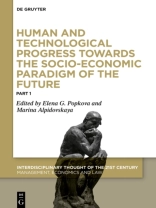This book explores the social consequences of digitization. The authors determine the problems, substantiate the perspectives, and offer recommendations for determining the role of human in modern digital society. The scientific concept ‘homo digital’ is developed, and the essence of its formation in the process of evolution of ‘homo economicus’ is studied. The transition from the post-industrial to the information society is also considered.
The authors show that in the context of the digital economy the problem of economization (commercialization) of non-economic (non-profit) spheres and types of economic activity become more urgent; they are analyzed through the prism of the theory of time in economics. Based on this, the increase of the influence of the consumer society on the modern social environment is shown. The key role of human capital in formation of a new quality of economic growth in the digital economic environment is substantiated, and transformation processes in the structure and practice of application of human capital are analyzed. The idea of social justice is reconsidered through the prism of digital society as a social environment with equal opportunities but different competences and motives.
Attention is paid to the modern Russian practice of influence of the digital economy on society on the whole and each human. Scientific and methodological recommendations for indicative evaluation of quality of economic growth in the conditions of digitization of Russia’s economic system are offered, and the specifics of the problem of socio-economic differentiation of the Russian population in the conditions of technological progress are shown. Based on this, it is proved that the digital economy has a contradictory influence on society, increasing the accessibility of goods and services, in particular hi-tech ones, but also causing an urgent need for adapting to the new economic conditions. This adaptation is largely determined by capabilities of people, flexibility of their thinking, and ability for learning and development. Thus, instead of the expected provision of balance of society, its disproportions could grow in practice. Also, specific features of regional migration in modern Russia in the context of digitization are determined.
The role of emotional intellect in formation of the critical thinking of a company’s employees is outlined. Due to this, it is shown that so called ‘human factor’, which is traditionally treated as a source of economic risks and costs, acquires a new role in the conditions of the digital economy – a source of value creation and reduction of risks of technological progress, due to justified opposition to unfavorable changes. Informal labor relations based on digital communications, as the highest form of evolution of these relations that is achieved in the conditions of Industry 4.0, is considered. The central role of higher education in the process of social adaptation to the conditions of Industry 4.0 is outlined. The economic and legal issues of the digital economy are considered – in particular, the issue of democracy in the digital society in the conditions of e-government.
关于作者
Elena G. Popkova, Moscow State Institute of International Relations
Marina Alpidovskaya Financial University, Russian Government












